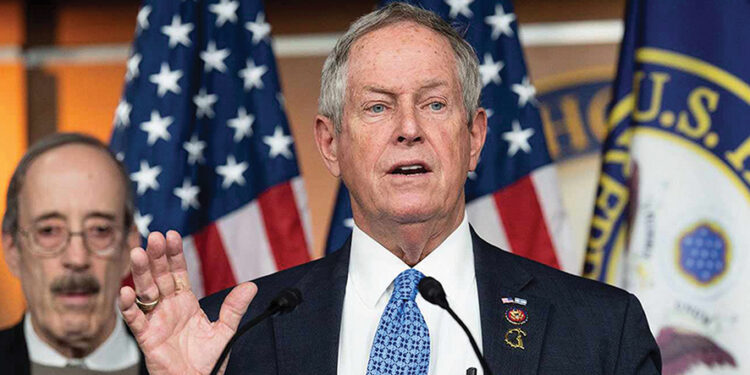Once hailed as a beacon of democracy in the post-Soviet region, Georgia is now at the center of growing concern in Washington. At a recent US Helsinki Commission hearing titled “From Partner to Problem: Georgia’s Anti-American Shift,” lawmakers voiced deep alarm over what they described as Georgia’s sharp turn away from democracy, and from its longstanding relationship with the United States.
Leading the charge was Congressman Joe Wilson, co-chair of the Commission, who didn’t mince words: “The government of Georgian Dream, which falsified elections, is dragging the Georgian people toward dictatorship,” he said. “They are stripping away sovereignty, condemning citizens to poverty, and betraying traditional allies, including the United States.”
According to Wilson, the ruling Georgian Dream party has become the architect of an authoritarian system; one that jails opposition leaders, attacks peaceful protesters, silences independent media, and consolidates power into a one-party state.
He described Georgia as a “laboratory of authoritarian control,” and warned that the current government lacks any real legitimacy.
But the threat, lawmakers said, goes beyond Georgia’s borders.
Wilson and others warned that the Georgian Dream isn’t just turning away from the West, it’s cozying up to US adversaries. The party, he said, is deepening ties with Russia and China, while actively undermining American business and security interests in the region.
“Georgian Dream has chosen to align with the Chinese Communist Party,” Wilson said, “even handing over control of a strategic Black Sea port; blocking American businesses and tying Georgia’s future to a regime openly preparing for confrontation with the American people.”
He went further, accusing the Georgian government of helping Russia evade international sanctions by facilitating the resale of Russian oil, all while Russian forces continue to occupy 20% of Georgia’s territory:
“This is a betrayal of the values and partnerships we’ve worked decades to build,” Wilson said. “What we’re seeing is the unraveling of everything the US has invested in.”
And yet, despite the government’s hardline stance, Wilson emphasized that the Georgian people haven’t given up. In fact, they’re fighting back: “Time and again, Georgians have taken to the streets in massive numbers,” he said. “They’re demanding democracy, sovereignty, and a future with the West.”
In response to Georgia’s democratic decline, US lawmakers introduced the MEGOBARI Act, short for ‘Mobilizing and Enhancing Georgia’s Options for Building Accountability, Resilience, and Independence.’ The bill aimed to pressure the Georgian government with targeted sanctions, while supporting civil society and democratic institutions.
The Act passed overwhelmingly in the US House in May 2025, but hit a wall in the Senate, where it failed to move forward after months of behind-the-scenes lobbying and political pressure.
Congressman Steve Cohen voiced his frustration at the hearing: “Unfortunately, the Senate didn’t pass it, and it looks like they’re not going to,” he said. “It might have been one business, one individual, that blocked the whole thing over a port deal.”
Cohen was blunt in his criticism, describing the ruling party as a danger to its own people, and to the region: “The Georgian Dream has become a Georgian nightmare,” he said. “Russia has occupied part of Georgia, and now it has an ally inside the country in the form of [Georgian Dream founder] Ivanishvili. That makes it easier to undermine the country from within.”
Cohen also reflected on how unusual, and meaningful, it was to see such bipartisan unity on the MEGOBARI Act: “It’s remarkable how many Democrats and Republicans came together to support this,” he said. “That kind of unity is almost unheard of these days.”
But even broad support wasn’t enough to overcome entrenched interests, and Cohen lamented how foreign policy too often becomes a casualty of domestic politics.
Back in Georgia, Prime Minister Irakli Kobakhidze welcomed the bill’s failure, calling it a “positive development.” Speaking to journalists, Kobakhidze framed the MEGOBARI Act as a “hostile act” against Georgia and its people, alleging that the legislation would have damaged Georgia’s sovereignty and national interests.
“The MEGOBARI Act was, in reality, a hostile act against the Georgian people, our state, and national interests. Fortunately, it has failed, which is very good,” he said.
Kobakhidze also used the moment to announce plans for a “reset” in US-Georgia relations.
“We have a specific goal to reset relations with a concrete roadmap from a clean slate and renew our strategic partnership with the US. We maintain hope for this. The rest depends on the new US administration itself,” he added.
In a particularly sharp rebuke, Kobakhidze lashed out at Georgian political figures who participated in the Helsinki Commission hearing — including former President Salome Zurabishvili and former Defense Minister Tinatin Khidasheli — accusing them of undermining national interests.
“We witnessed contemporary Sergo Ordzhonikidzes in Washington yesterday. It’s very tragic when a Georgian loses face, when a Georgian directly opposes their own state’s national interests. This is a tragic event, though it is their tragedy,” he said.
The PM also personally attacked US Congressman Joe Wilson, labeling him a “Deep State agent” and a “funded lobbyist,” signaling a further deterioration in diplomatic tone between Tbilisi and Washington.
The roots of the crisis trace back to 2023–2024, when the Georgian Dream-led government introduced a controversial “foreign agents” law, modeled on Russia’s. The law forced NGOs and media receiving foreign funding to register as foreign agents, sparking fears of a crackdown on civil liberties. Massive protests swept the country, but the government doubled down.
Tensions escalated further after the 2024 parliamentary elections, which many observers described as deeply flawed and held in an environment of democratic backsliding.
The US Helsinki Commission summarized the situation bluntly: “Georgian Dream is pulling the country into Russia’s orbit while deepening ties with China and other adversaries of the United States.”
It warned that the Georgian government has “dismantled institutions, blocked US businesses from access to Central Asian trade routes, and attracted Chinese investments that threaten Georgia’s sovereignty.”
As Georgia faces an uncertain future, US lawmakers are grappling with how to respond. The failure of the MEGOBARI Act has raised serious questions about America’s ability to hold authoritarian regimes accountable, especially when powerful business interests get in the way.
But one message rang clear throughout the hearing: the fight for democracy in Georgia isn’t over, and the US should not give up on its people.
“The Georgian people still want democracy, prosperity, and peace,” Wilson said. “And the United States must decide how to stand with them.”
By Team GT














